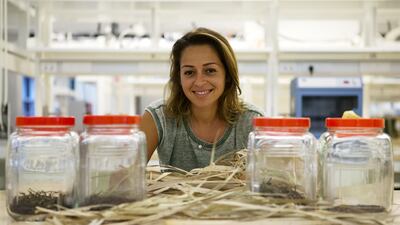One of the nicest things about driving in the UAE is the rows of palm trees that line many of the central reservations and roadside verges.
With their rugged trunks and wonderfully expansive green fronds, they can brighten the mood even when the traffic is jammed and the air conditioning is failing to do its job as outside temperatures soar to the high 40s.
Yet the presence of 40 million palm trees in the UAE, more than three-quarters of them in Abu Dhabi, is not without drawbacks.
In particular, these trees generate vast amounts of organic waste – each produces about about 15 kilograms of waste fronds a year.
What to do with all this waste? We could dump it in landfill, or burn it; but neither is a particularly attractive option, environmentally speaking.
Or, reckon researchers at the Masdar Institute of Science and Technology in Abu Dhabi, we could do something else. We could turn it into biochar, a charcoal-like substance that could help improve the UAE's agricultural land.
Biochar improves soil's nutrient content and helps it hold more water – helpful in a country where soil tend to be alkaline, saline and poor in nutrient.
The work, led by Dr Lina Yousef, an assistant professor of water and environmental engineering, has yet to be peer-reviewed and published. So for the moment, the scientists' conclusions are tentative, but their findings appear to offer cause for optimism.
To produce the carbon-rich biochar, plant material is heated with little or no oxygen.
In the Abu Dhabi study, palm fronds were heated to 400°C for 30 minutes in a muffle furnace, a type of kiln widely used to make ceramics.
The resulting material was then crushed into a powder. This powder was added to soil at various concentrations.
The improvements were little short of dramatic. With the addition of biochar, the soil could hold as much as 40 per cent more water.
Such significant improvements are especially important in the Arabian Gulf, according to Nahid Khalifa, a student in Dr Yousef's group. "[Increases in water retention are] crucial in this region, as it is dry for long periods throughout the year," said Ms Khalifa.
The presence of biochar also reduces the amount of salt that is leached into the water in the soil, according to Dr Yousef. It also improves nutrient content in the soil by acting as a "carrier".
Dr Yousef and her team have been focusing on analysing the biochar and how it changes the properties of the sandy UAE soil that it is added to.
Their research has not looked directly at how adding biochar to soil might change the soil's agricultural productivity in terms of crop yields.
However, if practices in other parts of the world, and during other eras of history, are anything to go by, it is possible that farmers in the Emirates would see an increase in crop yields if they began applying biochar to their soil.
The International Biochar Initiative, an organisation that promotes the use of biochar, highlights improvements in crop yields as one of biochar's key benefits.
"Biochar can be an important tool to increase food security and cropland diversity in areas with severely depleted soils, scarce organic resources and inadequate water and chemical fertiliser supplies," said the group in a briefing document.
Although biochar is the subject of cutting-edge research, its use in soil is not new. For two millennium, the "terra preta" or black earth soil around the Amazon basin have been made more fertile through humans' addition of charcoal material. In Japan, the practice is also long established. It is not, says Dr Yousef, a new technology but a "revisited technology".
In addition to making soil more suitable for crops, biochar also offers environmental benefits by "locking" the carbon into the soil and preventing it from being released into the atmosphere.
Unlike most organic material in soil, biochar cannot be broken down by microorganisms, such as bacteria or fungi, that live in the soil. This also means that the benefits it brings in improving water retention and nutrient content tend to be long-lasting, as the biochar is likely to be retained by the soil for decades.
"The nice thing about biochar is it's plant material, but it's been modified chemically by pyrolysis," said Dr Yousef, referring to decomposition brought about by high temperatures.
"It's a reorganisation of the carbon bonds … [they] become very heterogeneous. The microbes are not used to this heterogeneous material. For them to break down this material, they would have to evolve again to produce the right enzymes."
So is it likely that farmers in the UAE will start to use biochar in their soils? Dr Yousef certainly thinks it should be looked at.
"It's a very low-cost way of producing something that will improve the soil quality in Abu Dhabi," she said.
Once the studies are published in scientific journals – papers will probably appear in the Journal of Analytical and Applied Pyrolysis and Soil Use and Management – Dr Yousef says it would be possible to promote the benefits of biochar in the UAE.
And although biochar might not be right for every instance, Dr Yousef is confident that it could prove beneficial in some circumstances.
"It's definitely not feasible on a large scale, but on a targeted, precision scale," she said.
"We're hoping to get our work published first. Once we've got it published by peer review, we will have the arsenal to make proof-of-concept for these different organisations. But [already] there's interest in biochar."
newsdesk@thenational.ae

From palm waste to crop yields
Most popular today

